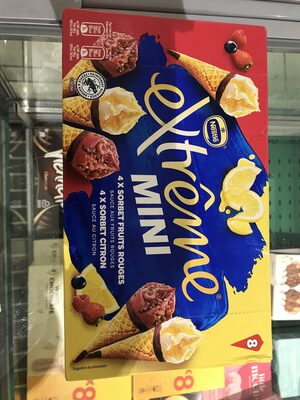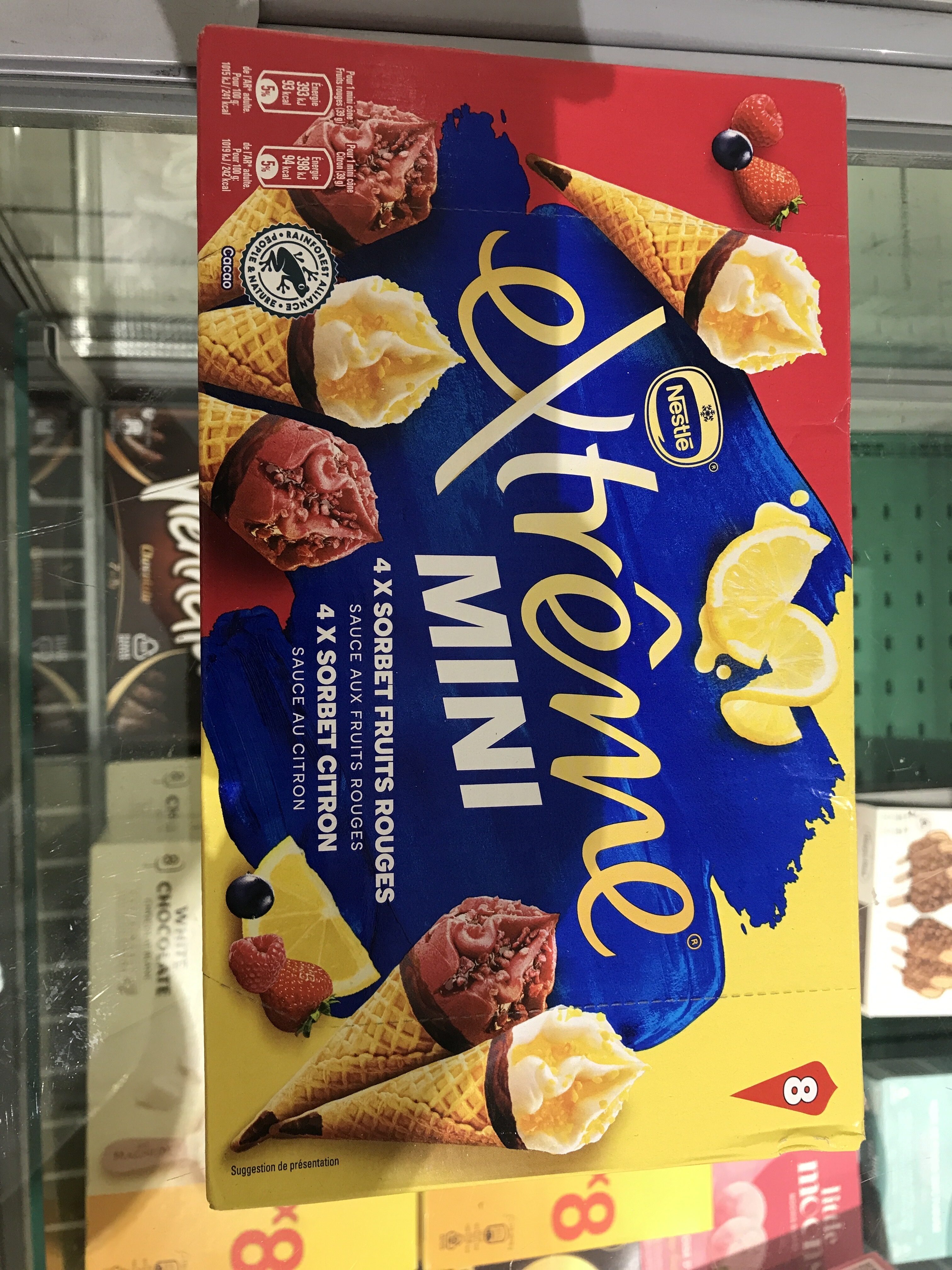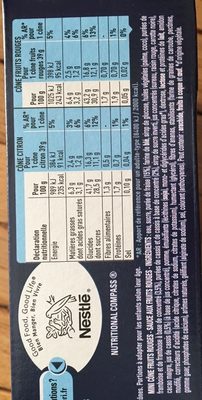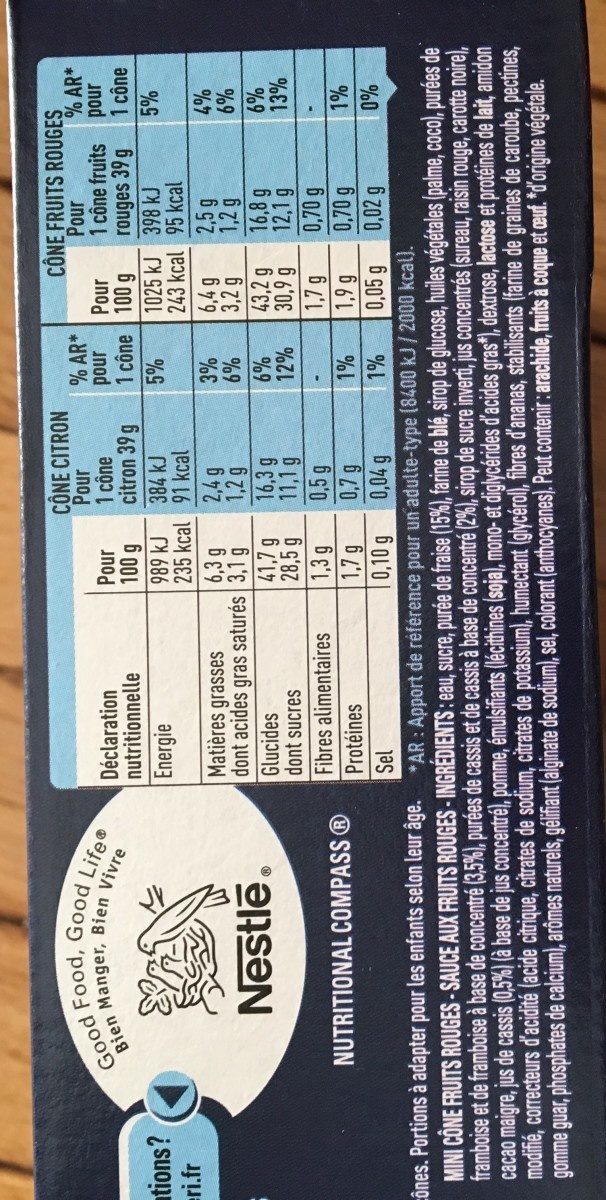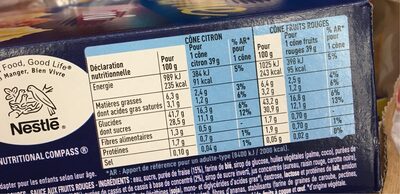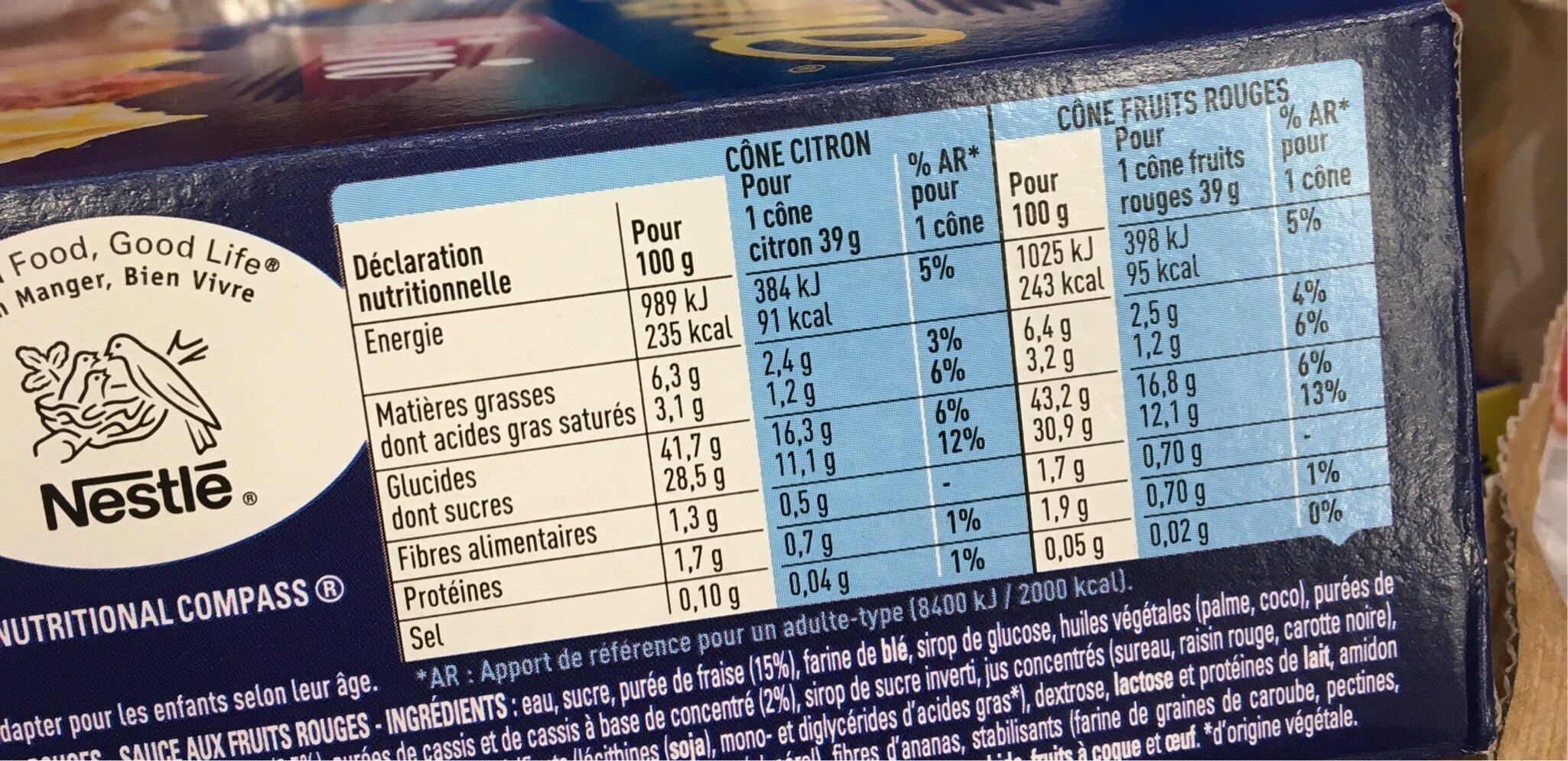Help us make food transparency the norm!
As a non-profit organization, we depend on your donations to continue informing consumers around the world about what they eat.
The food revolution starts with you!
Extreme Mini Citron/Fruits Rouges - Nestlé - 312g
Extreme Mini Citron/Fruits Rouges - Nestlé - 312g
This product page is not complete. You can help to complete it by editing it and adding more data from the photos we have, or by taking more photos using the app for Android or iPhone/iPad. Thank you!
×
Barcode: 7613036243803 (EAN / EAN-13)
Quantity: 312g
Brands: Nestlé
Categories: Desserts, Frozen foods, Frozen desserts, Ice creams and sorbets, Ice creams
Labels, certifications, awards:
Made in France, Rainforest Alliance
Countries where sold: France
Matching with your preferences
Health
Ingredients
-
43 ingredients
French: eau, sucre, purée de fraise (15%), farine de blé, sirop de glucose, huiles végétales (palme, coco), purées de framboise et de framboise à base de concentré (3,5%), purées de cassis et de cassis à base de concentré (2%), sirop de sucre inverti, jus concentrés (sureau, raisin rouge, carotte noire), cacao maigre, jus de cassis (0,5%) (à base de jus concentré), pomme, émulsifiants (lécithines (soja), mono - et diglycérides d'acides gras"), dextrose, lactose et protéines de lait, amidon modifié, correcteurs d'acidité (acide citrique, citrates de sodium, citrates de potassium), humectant (glycérol), fibres d'ananas, stabilisants (farine de graines de caroube, pectines, gomme guar, phosphates de calcium), arômes naturels, gélifiant (alginate de sodium), sel, colorant (anthocyanes). Peut contenir: arachide, fruits à coque et oeuf. *d'origine végétale.Allergens: Eggs, Gluten, Milk, Nuts, Peanuts, SoybeansTraces: Eggs, Nuts, Peanuts
Food processing
-
Ultra processed foods
Elements that indicate the product is in the 4 - Ultra processed food and drink products group:
- Additive: E14XX - Modified Starch
- Additive: E163 - Anthocyanins
- Additive: E322 - Lecithins
- Additive: E401 - Sodium alginate
- Additive: E412 - Guar gum
- Additive: E422 - Glycerol
- Additive: E440 - Pectins
- Additive: E471 - Mono- and diglycerides of fatty acids
- Ingredient: Colour
- Ingredient: Dextrose
- Ingredient: Emulsifier
- Ingredient: Flavouring
- Ingredient: Gelling agent
- Ingredient: Glucose
- Ingredient: Glucose syrup
- Ingredient: Humectant
- Ingredient: Invert sugar
- Ingredient: Lactose
- Ingredient: Milk proteins
Food products are classified into 4 groups according to their degree of processing:
- Unprocessed or minimally processed foods
- Processed culinary ingredients
- Processed foods
- Ultra processed foods
The determination of the group is based on the category of the product and on the ingredients it contains.
Additives
-
E163 - Anthocyanins
Anthocyanin: Anthocyanins -also anthocyans; from Greek: ἄνθος -anthos- "flower" and κυάνεος/κυανοῦς kyaneos/kyanous "dark blue"- are water-soluble vacuolar pigments that, depending on their pH, may appear red, purple, or blue. Food plants rich in anthocyanins include the blueberry, raspberry, black rice, and black soybean, among many others that are red, blue, purple, or black. Some of the colors of autumn leaves are derived from anthocyanins.Anthocyanins belong to a parent class of molecules called flavonoids synthesized via the phenylpropanoid pathway. They occur in all tissues of higher plants, including leaves, stems, roots, flowers, and fruits. Anthocyanins are derived from anthocyanidins by adding sugars. They are odorless and moderately astringent. Although approved to color foods and beverages in the European Union, anthocyanins are not approved for use as a food additive because they have not been verified as safe when used as food or supplement ingredients. There is no conclusive evidence anthocyanins have any effect on human biology or diseases.Source: Wikipedia
-
E322 - Lecithins
Lecithins are natural compounds commonly used in the food industry as emulsifiers and stabilizers.
Extracted from sources like soybeans and eggs, lecithins consist of phospholipids that enhance the mixing of oil and water, ensuring smooth textures in various products like chocolates, dressings, and baked goods.
They do not present any known health risks.
-
E322i - Lecithin
Lecithins are natural compounds commonly used in the food industry as emulsifiers and stabilizers.
Extracted from sources like soybeans and eggs, lecithins consist of phospholipids that enhance the mixing of oil and water, ensuring smooth textures in various products like chocolates, dressings, and baked goods.
They do not present any known health risks.
-
E330 - Citric acid
Citric acid is a natural organic acid found in citrus fruits such as lemons, oranges, and limes.
It is widely used in the food industry as a flavor enhancer, acidulant, and preservative due to its tart and refreshing taste.
Citric acid is safe for consumption when used in moderation and is considered a generally recognized as safe (GRAS) food additive by regulatory agencies worldwide.
-
E331 - Sodium citrates
Sodium citrate: Sodium citrate may refer to any of the sodium salts of citrate -though most commonly the third-: Monosodium citrate Disodium citrate Trisodium citrateThe three forms of the salt are collectively known by the E number E331. Sodium citrates are used as acidity regulators in food and drinks, and also as emulsifiers for oils. They enable cheeses to melt without becoming greasy.Source: Wikipedia
-
E332 - Potassium citrates
Potassium citrate: Potassium citrate -also known as tripotassium citrate- is a potassium salt of citric acid with the molecular formula K3C6H5O7. It is a white, hygroscopic crystalline powder. It is odorless with a saline taste. It contains 38.28% potassium by mass. In the monohydrate form it is highly hygroscopic and deliquescent. As a food additive, potassium citrate is used to regulate acidity and is known as E number E332. Medicinally, it may be used to control kidney stones derived from either uric acid or cystine.Source: Wikipedia
-
E412 - Guar gum
Guar gum (E412) is a natural food additive derived from guar beans.
This white, odorless powder is valued for its remarkable thickening and stabilizing properties, making it a common ingredient in various food products, including sauces, dressings, and ice creams.
When used in moderation, guar gum is considered safe for consumption, with no known adverse health effects.
-
E422 - Glycerol
Glycerol: Glycerol -; also called glycerine or glycerin; see spelling differences- is a simple polyol compound. It is a colorless, odorless, viscous liquid that is sweet-tasting and non-toxic. The glycerol backbone is found in all lipids known as triglycerides. It is widely used in the food industry as a sweetener and humectant and in pharmaceutical formulations. Glycerol has three hydroxyl groups that are responsible for its solubility in water and its hygroscopic nature.Source: Wikipedia
-
E440 - Pectins
Pectins (E440) are natural carbohydrates, predominantly found in fruits, that act as gelling agents in the food industry, creating the desirable jelly-like texture in jams, jellies, and marmalades.
Pectins stabilize and thicken various food products, such as desserts, confectioneries, and beverages, ensuring a uniform consistency and quality.
Recognized as safe by various health authorities, pectins have been widely used without notable adverse effects when consumed in typical dietary amounts.
-
E471 - Mono- and diglycerides of fatty acids
Mono- and diglycerides of fatty acids (E471), are food additives commonly used as emulsifiers in various processed foods.
These compounds consist of glycerol molecules linked to one or two fatty acid chains, which help stabilize and blend water and oil-based ingredients. E471 enhances the texture and shelf life of products like margarine, baked goods, and ice cream, ensuring a smooth and consistent texture.
It is generally considered safe for consumption within established regulatory limits.
Ingredients analysis
-
Palm oil
Ingredients that contain palm oil: Palm oil
-
Non-vegan
Non-vegan ingredients: Lactose and milk proteinsSome ingredients could not be recognized.
We need your help!
You can help us recognize more ingredients and better analyze the list of ingredients for this product and others:
- Edit this product page to correct spelling mistakes in the ingredients list, and/or to remove ingredients in other languages and sentences that are not related to the ingredients.
- Add new entries, synonyms or translations to our multilingual lists of ingredients, ingredient processing methods, and labels.
If you would like to help, join the #ingredients channel on our Slack discussion space and/or learn about ingredients analysis on our wiki. Thank you!
-
Vegetarian status unknown
Unrecognized ingredients: fr:purees-de-cassis-et-de-cassis-a-base-de-concentre, Elder, fr:a-base-de-jus-concentreSome ingredients could not be recognized.
We need your help!
You can help us recognize more ingredients and better analyze the list of ingredients for this product and others:
- Edit this product page to correct spelling mistakes in the ingredients list, and/or to remove ingredients in other languages and sentences that are not related to the ingredients.
- Add new entries, synonyms or translations to our multilingual lists of ingredients, ingredient processing methods, and labels.
If you would like to help, join the #ingredients channel on our Slack discussion space and/or learn about ingredients analysis on our wiki. Thank you!
-
Details of the analysis of the ingredients
We need your help!
Some ingredients could not be recognized.
We need your help!
You can help us recognize more ingredients and better analyze the list of ingredients for this product and others:
- Edit this product page to correct spelling mistakes in the ingredients list, and/or to remove ingredients in other languages and sentences that are not related to the ingredients.
- Add new entries, synonyms or translations to our multilingual lists of ingredients, ingredient processing methods, and labels.
If you would like to help, join the #ingredients channel on our Slack discussion space and/or learn about ingredients analysis on our wiki. Thank you!
fr: eau, sucre, purée de fraise 15%, farine de blé, sirop de glucose, huiles végétales de palme, huiles végétales de coco, purées de framboise 3.5%, de framboise 3.5%, purées de cassis et de cassis à base de concentré 2%, sirop de sucre inverti, jus concentrés (sureau, raisin rouge, carotte noire), cacao maigre, cassis 0.5% (à base de jus concentré), pomme, émulsifiants (lécithines de soja, mono- et diglycérides d'acides gras"), dextrose, lactose et protéines de lait, amidon modifié, correcteurs d'acidité (acide citrique, citrates de sodium, citrates de potassium), humectant (glycérol), fibres d'ananas, stabilisants (farine de graines de caroube, pectines, gomme guar, phosphates de calcium), arômes naturels, gélifiant (alginate de sodium), sel, colorant (anthocyanes)- eau -> en:water - vegan: yes - vegetarian: yes - ciqual_food_code: 18066 - percent_min: 15 - percent_max: 45
- sucre -> en:sugar - vegan: yes - vegetarian: yes - ciqual_proxy_food_code: 31016 - percent_min: 15 - percent_max: 28.5
- purée de fraise -> en:strawberry-puree - vegan: maybe - vegetarian: maybe - ciqual_food_code: 13014 - percent_min: 15 - percent: 15 - percent_max: 15
- farine de blé -> en:wheat-flour - vegan: yes - vegetarian: yes - ciqual_proxy_food_code: 9410 - percent_min: 3.5 - percent_max: 15
- sirop de glucose -> en:glucose-syrup - vegan: yes - vegetarian: yes - ciqual_proxy_food_code: 31016 - percent_min: 3.5 - percent_max: 15
- huiles végétales de palme -> en:palm-oil - vegan: yes - vegetarian: yes - from_palm_oil: yes - ciqual_food_code: 16129 - percent_min: 3.5 - percent_max: 14.25
- huiles végétales de coco -> en:coconut-oil - vegan: yes - vegetarian: yes - from_palm_oil: no - ciqual_food_code: 16040 - percent_min: 3.5 - percent_max: 11.9
- purées de framboise -> en:raspberry-puree - vegan: maybe - vegetarian: maybe - ciqual_food_code: 13015 - percent_min: 3.5 - percent: 3.5 - percent_max: 3.5
- de framboise -> en:raspberry - vegan: yes - vegetarian: yes - ciqual_food_code: 13015 - percent_min: 3.5 - percent: 3.5 - percent_max: 3.5
- purées de cassis et de cassis à base de concentré -> fr:purees-de-cassis-et-de-cassis-a-base-de-concentre - percent_min: 2 - percent: 2 - percent_max: 2
- sirop de sucre inverti -> en:invert-sugar-syrup - vegan: yes - vegetarian: yes - percent_min: 0.5 - percent_max: 2
- jus concentrés -> en:concentrated-juice - vegan: maybe - vegetarian: maybe - percent_min: 0.5 - percent_max: 2
- sureau -> en:elder - percent_min: 0.166666666666667 - percent_max: 2
- raisin rouge -> en:red-grape - vegan: yes - vegetarian: yes - ciqual_food_code: 13112 - percent_min: 0 - percent_max: 1
- carotte noire -> en:black-carrot - vegan: yes - vegetarian: yes - ciqual_food_code: 20009 - percent_min: 0 - percent_max: 0.666666666666667
- cacao maigre -> en:fat-reduced-cocoa - vegan: yes - vegetarian: yes - ciqual_proxy_food_code: 18100 - percent_min: 0.5 - percent_max: 2
- cassis -> en:blackcurrant - vegan: yes - vegetarian: yes - ciqual_food_code: 13007 - percent_min: 0.5 - percent: 0.5 - percent_max: 0.5
- à base de jus concentré -> fr:a-base-de-jus-concentre - percent_min: 0.5 - percent_max: 0.5
- pomme -> en:apple - vegan: yes - vegetarian: yes - ciqual_food_code: 13050 - percent_min: 0 - percent_max: 0.5
- émulsifiants -> en:emulsifier - percent_min: 0 - percent_max: 0.5
- lécithines de soja -> en:soya-lecithin - vegan: yes - vegetarian: yes - ciqual_food_code: 42200 - percent_min: 0 - percent_max: 0.5
- mono- et diglycérides d'acides gras" -> en:e471 - vegan: maybe - vegetarian: maybe - from_palm_oil: maybe - percent_min: 0 - percent_max: 0.25
- dextrose -> en:dextrose - vegan: yes - vegetarian: yes - ciqual_proxy_food_code: 31016 - percent_min: 0 - percent_max: 0.5
- lactose et protéines de lait -> en:lactose-and-milk-proteins - vegan: no - vegetarian: yes - percent_min: 0 - percent_max: 0.5
- amidon modifié -> en:modified-starch - vegan: yes - vegetarian: yes - ciqual_proxy_food_code: 9510 - percent_min: 0 - percent_max: 0.5
- correcteurs d'acidité -> en:acidity-regulator - percent_min: 0 - percent_max: 0.5
- acide citrique -> en:e330 - vegan: yes - vegetarian: yes - percent_min: 0 - percent_max: 0.5
- citrates de sodium -> en:e331 - vegan: yes - vegetarian: yes - percent_min: 0 - percent_max: 0.25
- citrates de potassium -> en:e332 - vegan: yes - vegetarian: yes - percent_min: 0 - percent_max: 0.166666666666667
- humectant -> en:humectant - percent_min: 0 - percent_max: 0.5
- glycérol -> en:e422 - vegan: maybe - vegetarian: maybe - percent_min: 0 - percent_max: 0.5
- fibres d'ananas -> en:pineapple-fibre - vegan: yes - vegetarian: yes - percent_min: 0 - percent_max: 0.5
- stabilisants -> en:stabiliser - percent_min: 0 - percent_max: 0.5
- farine de graines de caroube -> en:carob-seed-flour - vegan: yes - vegetarian: yes - ciqual_proxy_food_code: 9410 - percent_min: 0 - percent_max: 0.5
- pectines -> en:e440a - vegan: yes - vegetarian: yes - percent_min: 0 - percent_max: 0.25
- gomme guar -> en:e412 - vegan: yes - vegetarian: yes - percent_min: 0 - percent_max: 0.166666666666667
- phosphates de calcium -> en:e341 - vegan: yes - vegetarian: yes - percent_min: 0 - percent_max: 0.125
- arômes naturels -> en:natural-flavouring - vegan: maybe - vegetarian: maybe - percent_min: 0 - percent_max: 0.5
- gélifiant -> en:gelling-agent - percent_min: 0 - percent_max: 0.5
- alginate de sodium -> en:e401 - vegan: yes - vegetarian: yes - percent_min: 0 - percent_max: 0.5
- sel -> en:salt - vegan: yes - vegetarian: yes - ciqual_food_code: 11058 - percent_min: 0 - percent_max: 0.1
- colorant -> en:colour - percent_min: 0 - percent_max: 0.1
- anthocyanes -> en:e163 - vegan: yes - vegetarian: yes - percent_min: 0 - percent_max: 0.1
Nutrition
-
Average nutritional quality
⚠ ️Warning: the amount of fruits, vegetables and nuts is not specified on the label, it was estimated from the list of ingredients: 22This product is not considered a beverage for the calculation of the Nutri-Score.
Positive points: 1
- Proteins: 1 / 5 (value: 1.7, rounded value: 1.7)
- Fiber: 1 / 5 (value: 1.3, rounded value: 1.3)
- Fruits, vegetables, nuts, and colza/walnut/olive oils: 0 / 5 (value: 22.4791666666667, rounded value: 22.5)
Negative points: 11
- Energy: 2 / 10 (value: 989, rounded value: 989)
- Sugars: 6 / 10 (value: 28.5, rounded value: 28.5)
- Saturated fat: 3 / 10 (value: 3.1, rounded value: 3.1)
- Sodium: 0 / 10 (value: 40, rounded value: 40)
The points for proteins are not counted because the negative points are greater or equal to 11.
Nutritional score: (11 - 1)
Nutri-Score:
-
Nutrient levels
-
Fat in moderate quantity (6.3%)
What you need to know- A high consumption of fat, especially saturated fats, can raise cholesterol, which increases the risk of heart diseases.
Recommendation: Limit the consumption of fat and saturated fat- Choose products with lower fat and saturated fat content.
-
Saturated fat in moderate quantity (3.1%)
What you need to know- A high consumption of fat, especially saturated fats, can raise cholesterol, which increases the risk of heart diseases.
Recommendation: Limit the consumption of fat and saturated fat- Choose products with lower fat and saturated fat content.
-
Sugars in high quantity (28.5%)
What you need to know- A high consumption of sugar can cause weight gain and tooth decay. It also augments the risk of type 2 diabetes and cardio-vascular diseases.
Recommendation: Limit the consumption of sugar and sugary drinks- Sugary drinks (such as sodas, fruit beverages, and fruit juices and nectars) should be limited as much as possible (no more than 1 glass a day).
- Choose products with lower sugar content and reduce the consumption of products with added sugars.
-
Salt in low quantity (0.1%)
What you need to know- A high consumption of salt (or sodium) can cause raised blood pressure, which can increase the risk of heart disease and stroke.
- Many people who have high blood pressure do not know it, as there are often no symptoms.
- Most people consume too much salt (on average 9 to 12 grams per day), around twice the recommended maximum level of intake.
Recommendation: Limit the consumption of salt and salted food- Reduce the quantity of salt used when cooking, and don't salt again at the table.
- Limit the consumption of salty snacks and choose products with lower salt content.
-
-
Nutrition facts
Nutrition facts As sold
for 100 g / 100 mlAs sold
per serving (39g par cône)Compared to: Ice creams Energy 989 kj
(235 kcal)386 kj
(91 kcal)+2% Fat 6.3 g 2.46 g -45% Saturated fat 3.1 g 1.21 g -59% Carbohydrates 41.7 g 16.3 g +49% Sugars 28.5 g 11.1 g +26% Fiber 1.3 g 0.507 g +45% Proteins 1.7 g 0.663 g -48% Salt 0.1 g 0.039 g -40% Fruits‚ vegetables‚ nuts and rapeseed‚ walnut and olive oils (estimate from ingredients list analysis) 22.479 % 22.479 %
Environment
-
Eco-Score B - Low environmental impact
⚠ ️Select a country in order to include the full impact of transportation.The Eco-Score is an experimental score that summarizes the environmental impacts of food products.→ The Eco-Score was initially developped for France and it is being extended to other European countries. The Eco-Score formula is subject to change as it is regularly improved to make it more precise and better suited to each country.Life cycle analysis
-
Average impact of products of the same category: A (Score: 87/100)
Category: Ice cream, cone (normal size)
Category: Ice cream, cone (normal size)
- PEF environmental score: 0.22 (the lower the score, the lower the impact)
- including impact on climate change: 1.75 kg CO2 eq/kg of product
Stage Impact Agriculture
56.9 %Processing
18.1 %Packaging
6.7 %Transportation
6.9 %Distribution
7.2 %Consumption
4.2 %
Bonuses and maluses
-
Missing origins of ingredients information
Malus: -5
⚠ ️ The origins of the ingredients of this product are not indicated.
If they are indicated on the packaging, you can modify the product sheet and add them.
If you are the manufacturer of this product, you can send us the information with our free platform for producers.
-
Ingredients that threatens species
Malus: -10
Contains palm oil
Tropical forests in Asia, Africa and Latin America are destroyed to create and expand oil palm tree plantations. The deforestation contributes to climate change, and it endangers species such as the orangutan, the pigmy elephant and the Sumatran rhino.
-
Missing packaging information for this product
Malus: -15
⚠ ️ The information about the packaging of this product is not filled in.⚠ ️ For a more precise calculation of the Eco-Score, you can modify the product page and add them.
If you are the manufacturer of this product, you can send us the information with our free platform for producers.
Eco-Score for this product
-
Impact for this product: B (Score: 67/100)
Product: Extreme Mini Citron/Fruits Rouges - Nestlé - 312g
Life cycle analysis score: 87
Sum of bonuses and maluses: -20
Final score: 67/100
-
Carbon footprint
-
Equal to driving 0.9 km in a petrol car
175 g CO² per 100g of product
The carbon emission figure comes from ADEME's Agribalyse database, for the category: Ice cream, cone (normal size) (Source: ADEME Agribalyse Database)
Stage Impact Agriculture
61.0 %Processing
12.3 %Packaging
10.3 %Transportation
11.3 %Distribution
3.7 %Consumption
1.4 %
Packaging
-
Missing packaging information for this product
⚠ ️ The information about the packaging of this product is not filled in.Take a photo of the recycling information Take a photo of the recycling information
Transportation
-
Origins of ingredients
Missing origins of ingredients information
⚠ ️ The origins of the ingredients of this product are not indicated.
If they are indicated on the packaging, you can modify the product sheet and add them.
If you are the manufacturer of this product, you can send us the information with our free platform for producers.Add the origins of ingredients for this product Add the origins of ingredients for this product
Threatened species
-
Contains palm oil
Drives deforestation and threatens species such as the orangutan
Tropical forests in Asia, Africa and Latin America are destroyed to create and expand oil palm tree plantations. The deforestation contributes to climate change, and it endangers species such as the orangutan, the pigmy elephant and the Sumatran rhino.
Labels
Report a problem
-
Incomplete or incorrect information?
Category, labels, ingredients, allergens, nutritional information, photos etc.
If the information does not match the information on the packaging, please complete or correct it. Open Food Facts is a collaborative database, and every contribution is useful for all.
Data sources
Product added on by kiliweb
Last edit of product page on by mariacastiel.
Product page also edited by charlesnepote, date-limite-app, mylene0585, openfoodfacts-contributors, roboto-app, smoothie-app, yuka.ApdbLsDWQtMlPPPM6rkX5yDnCevyMeZ_P0QNoQ, yuka.V0tZcU9yUXNxOW9iaS9JODNRbUo0dnQzNllTc1ltQ1RLY29oSVE9PQ, yuka.sY2b0xO6T85zoF3NwEKvlldEePnFuiyYb0LQh1eq9NaiMoXyaupp2q3QFKs.
